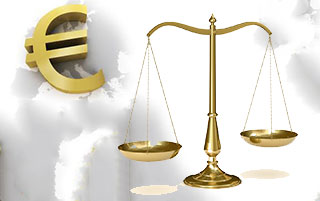Recent numbers from China are keeping the negative sentiment in the financial markets so far. They add to the downward pressure on oil and most of the industrial metals, and bring about fears of a decline in the world’s aggregate demand. This generates panic in the financial markets, which in turn intensifies the negativity and heightens market instability. But the low commodity prices and the Chinese slowdown that have brought about turmoil in the financial markets, are not quite as steep as the markets show. Moreover, they cast a long shadow over encouraging news from other economies.
EU Employment Offers Some Encouragement
There are encouraging figures coming from the European Union, a place that has been known lately for chronic economic malaise. Unemployment in the 28 country block is down to 10.4%, which is the best figure since 2011. Although inflation is close to zero, which is worrying, this is mainly due to low oil prices, and increased employment could mean that consumption will help buoy inflation. Low oil prices also serves to put more money in consumer’s pockets, which could help avoid dangerous deflation. For the time being, the news out of Europe, point towards increased economic stability, even though Europeans are still not out of the woods.
Germany Leading the Charge
As has been the case lately, Germany seems to be doing particularly well within the EU. With unemployment reports expected to show around 6.5% unemployment, it is clear that the export-oriented economy is sputtering on despite a slowdown in China and faltering financial markets. This is counter-intuitive, since China became one of the most important importers of German machinery and durable goods.
It is possible that the weakness of the Euro is buoying German exports. In fact the economic stimulus from the European Central Bank has weakened the Euro while largely failing to boost inflation. But even on this front, there are increasing signs of stability. The Euro is no longer sliding against the US Dollar. In fact, it is making very moderate gains against the greenback. It is still quite low and will remain low as long as the ECB keeps stimulating the economy. This means Germany can count on a weaker than usual Euro to keep boosting its exports.
Cheaper Oil Also a Booster
The ECB has largely failed to boost inflation because of lower commodity prices. However, these low commodity prices, with oil prices leading the way, are also supporting lower industrial costs in the EU. This means that European exports are enjoying an additional competitive advantage besides the low Euro. The question now is, when will the investors start seeing that some islands of stability are emerging in unexpected places, as a result of lower commodity prices?
Better Days Ahead
Encouraging news from Europe will probably turn investor sentiment if it becomes more consistent. In any case China is slowing down, but it is not stopping altogether, and it seems that other countries that were not doing so well before, are starting to find their footing. Oil prices have also sustained their tepid rebound from 12 year lows 10 days ago, which also points toward stability. Financial markets will probably not return to their raging bullish years any time soon, but there are enough signs of stability that should help them come to their senses.



